Bwiti temples

Mama Aline
Mama Aline Tsinamotombi Temple near Lambaréné www.mamaAline.com - the best!
Here is a short list of temples I have visited that are worth knowing. This is by no means a complete list of all the temples, as there are about 1,800 of them. However, from my research, these are the best places to undergo ceremonies for Western people. The best of the best is Mama Aline's place—I have fallen in love with this temple.
Click on the links below to jump directly to that temple.
| Mama-Aline (Gabon) | AwakenYourSoul - Anthony (Costa Rica) |
| Asoko (Gabon) | Mapunza (Gabon) |
| Assossa (Gabon) | Mar (Nyangou) and Coco (Moudanga) (Gabon) |
| Luis-Makonza Da Silva (Makonza) (Canada) | Mbeng N'Tam (Gabon) |
| Bossissi (Gabon) | Michael Cassidy (Mboma) (Mexico) |
| Celine (Netherlands) | Minga Jean Martin (Gabon) |
| Ebando (Gabon) | Mot (Senegal) |
| Elizabeth Bast | Moughenda (Gabon) |
| Levi-Barker and Gary Cook (Costa Rica) | Olga-Ditengou (Gabon) |
| Adumangana (Mboka Nziambe - Gabon) | Ryan (Ghenigho) and Steven (Moubengui) and Rupi (Portugal) |


What do you need to know before you go to Gabon for a Bwiti ceremony?
If you are interested in participating in a traditional iboga ceremony in Africa, Gabon is likely the best place to go. This sovereign state, located on the west coast of Central Africa, is known as the "Tibet" of Africa in the spiritual sense due to the prevalence of Bwiti culture and the use of iboga in the country. Gabon shares borders with Equatorial Guinea to the northwest, Cameroon to the north, and the Republic of the Congo to the east and south. While iboga is traditionally used in all of these countries, it has been used for centuries in Gabon as part of various Bwiti rituals to facilitate spiritual growth and strengthen community bonds. It is also used for healing and as a rite of passage. In smaller doses, it is used as a stimulant during hunting expeditions.
Gabon has a low population density and abundant natural resources, such as petroleum and wood, which have attracted significant foreign private investment (especially from the Chinese), making it one of the most prosperous countries in Sub-Saharan Africa. Despite this, many Gabonese remain poor, and the investments are often ambiguous.
Gabon is home to about 1.5 million people from over forty different ethnic groups, most of whom are of Bantu origin. French is spoken by approximately 80% of the population. The Babongo pygmies are credited with originating the Bwiti religion and the use of iboga, which they are said to have discovered a thousand years ago. The Fang and Mitsogho peoples are also Bwiti practitioners. Although some Bwiti practitioners have incorporated Christianity into their practices, many do not follow this trend. Some Catholic missionaries continue to oppose Bwiti and its widespread practice throughout Gabon, but the president himself is a Bwiti initiate. Iboga is recognized as a cultural heritage in Gabon, and it is illegal to export it without a permit.
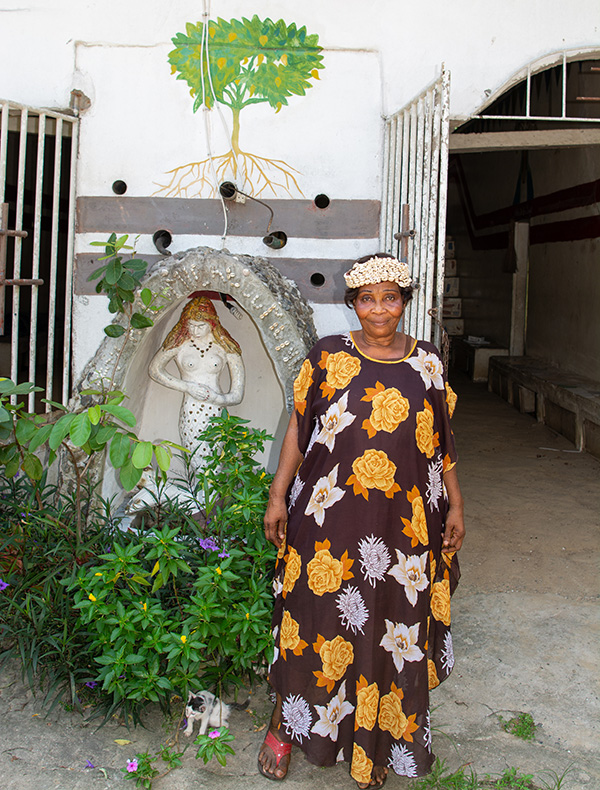
Mama Jeje (Djetje Moussounda) - Mombaiano tradition, Christian Bwiti mix
Within the Bwiti culture, there are various types of rites that differ depending on the ethnic group. These ceremonies are overseen by a spiritual leader, known as the N'ganga, who guides the community through the ritual. Men's ceremonies are led by male N'gangas, while female N'gangas lead women's rituals. The temples where these ceremonies take place are separate, with small wooden huts for men and women. The instruments used during the ceremony also differ by gender, with the 8-string Ngombi harp having more feminine energy and the Mongongo mouth-bow having more masculine energy. The ritual involves percussion, hand clapping, and singing, which are believed to induce trance states.
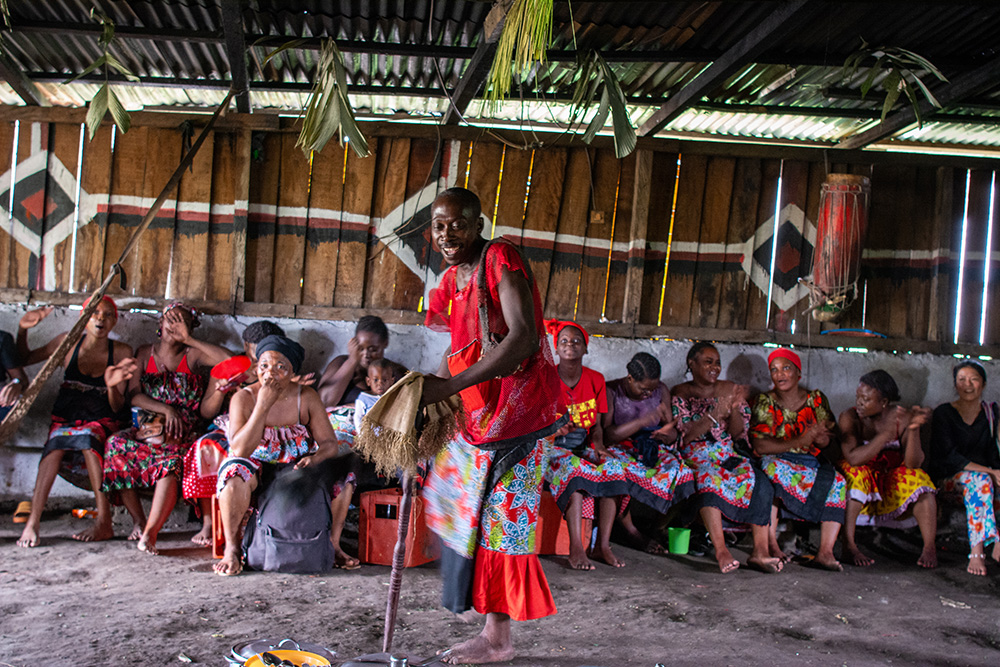
Nganga Mapunza temple
During the ritual, community members, musicians from other villages, children, elders, and healers sit on benches lining the temple's sides, accompanying the rite of passage or healing process that lasts three to five days for men and up to several weeks for women. This process is complex and delicate, requiring a skilled N'ganga to lead it effectively.
If you are considering an iboga initiation in Gabon as a means of experiencing a foreign culture, it may not be the best option. There are many other ways to explore Bwiti, especially the Ombwiri branch that does not use iboga but uses other plants for healing. It is important to remember that iboga is a plant that must be respected. To truly benefit from a profound death-rebirth experience, it is recommended to seek initiation into the Bwiti. However, this decision should not be taken lightly, and you must ask yourself if you are ready for the journey ahead.

The single best place I can recommend out of about 50 temples that I have visited in Gabon is Mama Aline's village. The energy alone in her village is enough for a full process. Add a ceremony to it and the help of Mama Aline with Jean Claude Nzamba, and you have the best place in Gabon. It is also suitable for Western people, as it is fitted with air conditioning and XXXL mosquito nets everywhere. Her processes are also unique as she only uses fresh iboga that works faster, deeper, and less long.

Simulium fly (Black fly or Foerho)

Anopheles mosquito
Having said that, the small foeho will bite after 2 hours of DEET application and can cause black fly fever, so taking Artemisia annua is a good idea to protect yourself against parasites, including malaria from the Anopheles mosquito. Malaria is a well-known phenomenon in Gabon, and the country is well-prepared with medication. Bwiti villages also have medication ready in case of issues. The main medication used is Malacur 40/320 (Dihydroartemisinin + Phosphate de Piperaquine).
Yellow fever vaccination is mandatory in Gabon, so make sure you take your yellow booklet with you, as it will be checked at the airport.
Ingesting iboga has certain dietary restrictions. To understand this, let’s look at the reason plants produce alkaloids in the first place.
Plants produce alkaloids for a variety of reasons, but one of the main reasons is defense against predators and pests. Alkaloids are a diverse group of naturally occurring chemical compounds that contain nitrogen in their structure and can have potent physiological effects on animals, including humans.
Some alkaloids, such as caffeine and nicotine, are produced by plants as natural pesticides to deter herbivores. Others, like morphine and codeine, defend against pathogens or attract pollinators. Alkaloids can also have medicinal properties, as seen in quinine from cinchona bark, which treats malaria.
In the case of iboga, alkaloids protect the plant against pathogens. Ingesting iboga kills harmful bacteria and fungi but also depletes good intestinal bacteria, similar to antibiotics. After a ceremony, it’s essential to rebuild probiotics (e.g., using Seed) and avoid sugar and gluten. Sugar encourages harmful bacteria growth, and gluten can cause issues in a gut without probiotic protection. This sensitivity lasts up to three months. Milk thistle is also beneficial for liver support.
Before a Bwiti ceremony, avoid drugs and medications like Malarone that lower the heart’s QT interval. While there’s no strict pre-ceremony diet, increasing potassium and magnesium intake is helpful. Milk thistle also strengthens the liver in preparation.
It is essential to be in good physical and mental shape to undertake a five-day initiation process involving large doses of iboga, night-long rituals, dancing, and sleeping on hard floors in a tropical environment. A stress ECG or 24-hour Holter monitor test and a liver function blood test are recommended before traveling to Gabon. Eat healthily, exercise, and rest well in the months leading up to initiation.
VISA
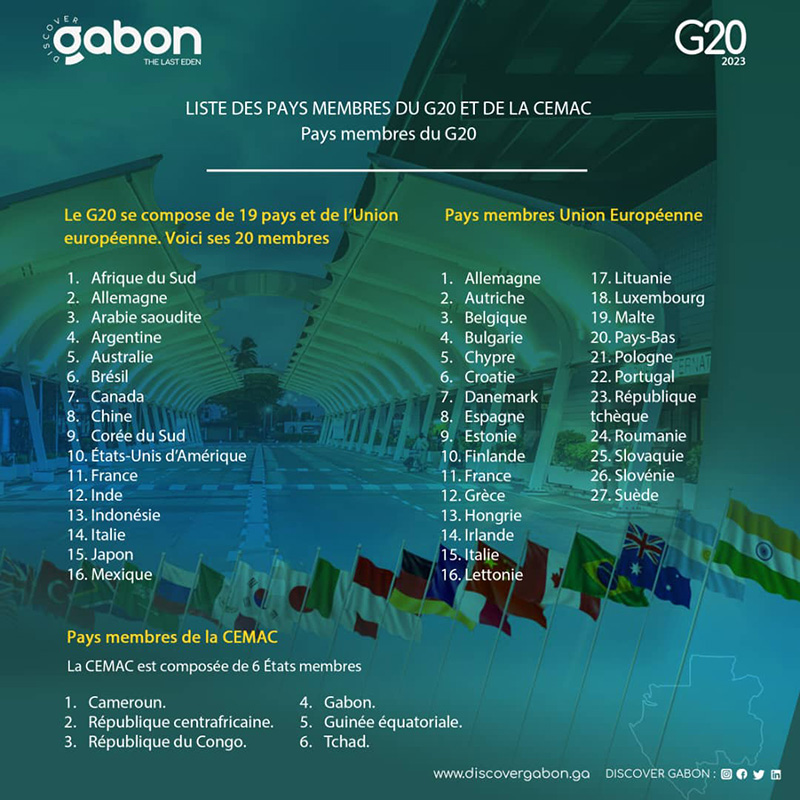
In 2023, G20 countries no longer need to apply for a VISA online or provide an invitation to enter Gabon. Upon landing in Libreville, you can obtain a free 30-day VISA. This VISA can be renewed for up to 90 days.
Mboka Nziambe

Adumangana (Moutsinga Constant)
Nima Minga
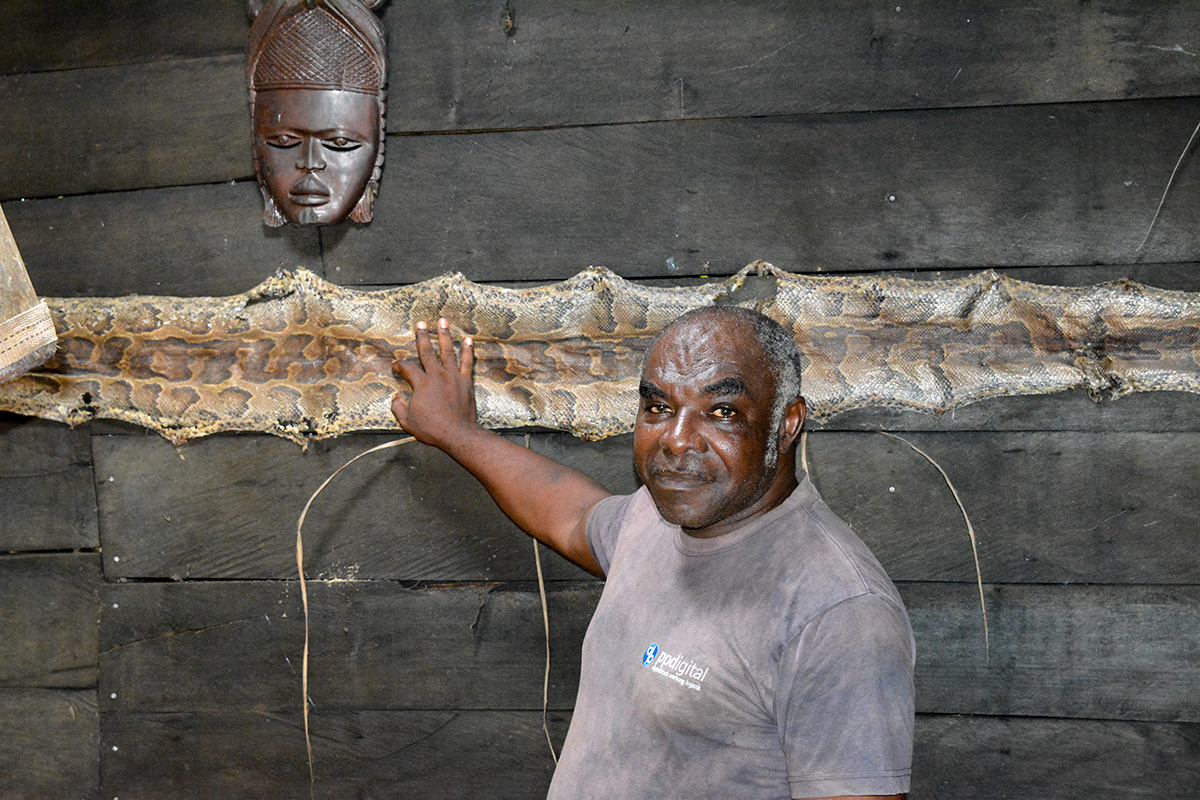
Dissumba initiations with Minga Jean Martin

Here is an authentic Dissumba temple. As you can see, they are lower.
WhatsApp: +241 77526021
His temple is on the main road to Lambaréné on the equator. It is near the pink village, which is also a Bwiti hotspot but is no longer active.
Ebando
Ebando is an NGO run by Tatayo, a Frenchman who was introduced to Bwiti by Papa Andre about 50 years ago. He has helped the Bwiti religion in many ways, including introducing it to Westerners. Most people initiated into Bwiti in Gabon started here. However, with the internet, people now explore Gabon more deeply.
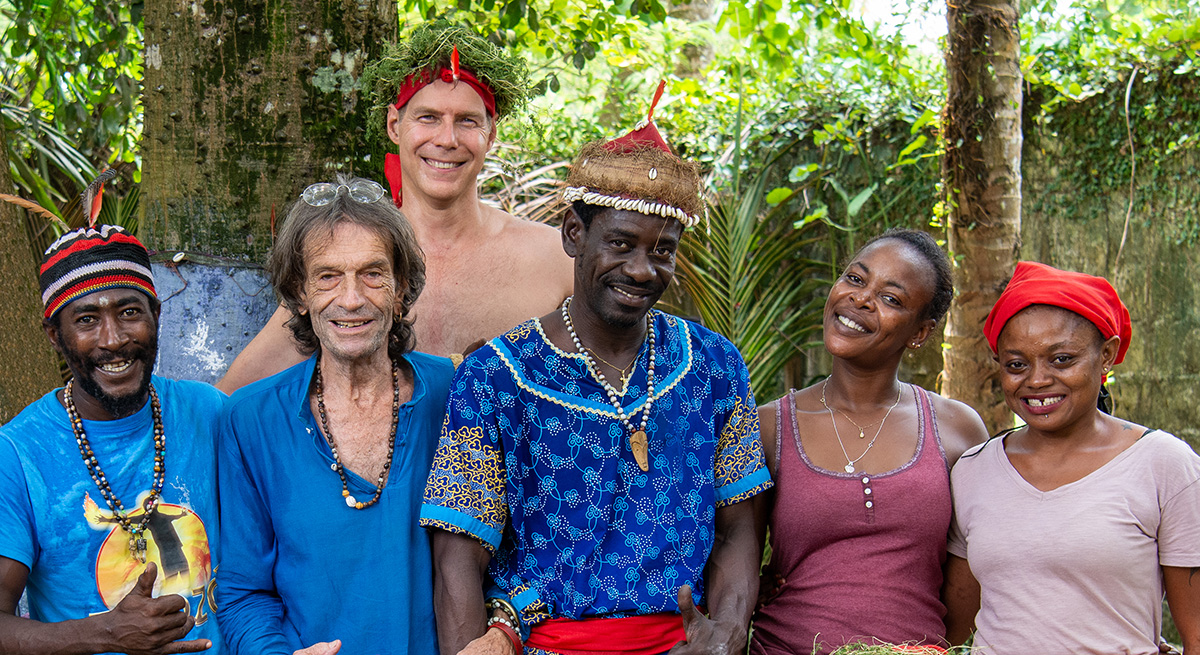
Tatayo (standing in front of me) first came to Gabon in 1971 at the age of 21, became a Gabonese citizen, and settled in Libreville. He was the first white person initiated into the Bwiti Fang tradition in Gabon in 1979 and was later initiated into the Misokko traditions in 1994. Many say Tatayo has since “opened the door” to Westerners in Gabon and has served as a guide for numerous expeditions and missions, including National Geographic, the BBC, and others. He founded Ebando almost 40 years ago.

Papa Andre, starting point of Ebando

Gemamba (Root teacher of Tatayo and brother of Papa Andre)
-- -- --
Mama Aline

Mama Aline, also called Mama Opougua (Elombo tradition)
This is by far the best place in Gabon to receive a full Bwiti initiation. She can arrange translators for English. Her expertise includes Bwiti initiations called Elombo, Mabandji, Ologuo, and Mboumba Yano.
Tsinamotombi Temple (Located in Tchad, near Lambaréné)
Mama Opougua (Mama Aline) aka Nzamba Aline Lydie
WhatsApp: +241 06509159 (French only)
Asoko

Asoko & Mama Ani-es (Miobe tradition)
WhatsApp: +241 74504400
Miobe tradition focuses on knowledge of the plants and spirits of the forest. His companion is Mama Ani-es.
Moughenda

Moughenda
Moughenda Mikala, a renowned 10th Generation Missoko Bwiti Shaman, is highly regarded for introducing Bwiti Missoko to international audiences. He used to operate in Costa Rica and California but is now back in Gabon. With over 30 years of experience and having initiated more than 10,000 individuals into Iboga, he is seen as an authentic figure for Bwiti initiation, healing, or training. However, it is the most expensive place for initiation in Gabon and worldwide.
Bossissi

Bossissi Bangoye (16th generation Bwiti)
WhatsApp: +241 77946209
Located near Lambaréné in the village of Komi. His father initiated Tatayo from Ebando. His companion is Mama Vana.

Motamba, who initiated Tatayo and Pemba (Ebando) back in 1994.
Mbeng N'tam

Mbeng N'Tam village (Marie Claire)
Currently not recommended for visits.
The Origin

Celine
Netherlands
Mot

Mot
Senegal
WhatsApp: +47 913 23 163
Awaken Your Soul

Anthony
Costa Rica
Atome Ribenga Temple

Atome Ribenga Temple
Dissumba
Master initiator of the Mboumba Eyano, the Mimbara, and the Biyeyem Ozeng. Atome passed away in 2022, but the temple remains active.

Michael (Mboma) Cassidy


(Moughenda student)
Luis Makonza Da Silva (Makonza)


Ryan (Ghenigho), Steven (Moubengui), and Rupi


Iboga Wellness Center Costa Rica
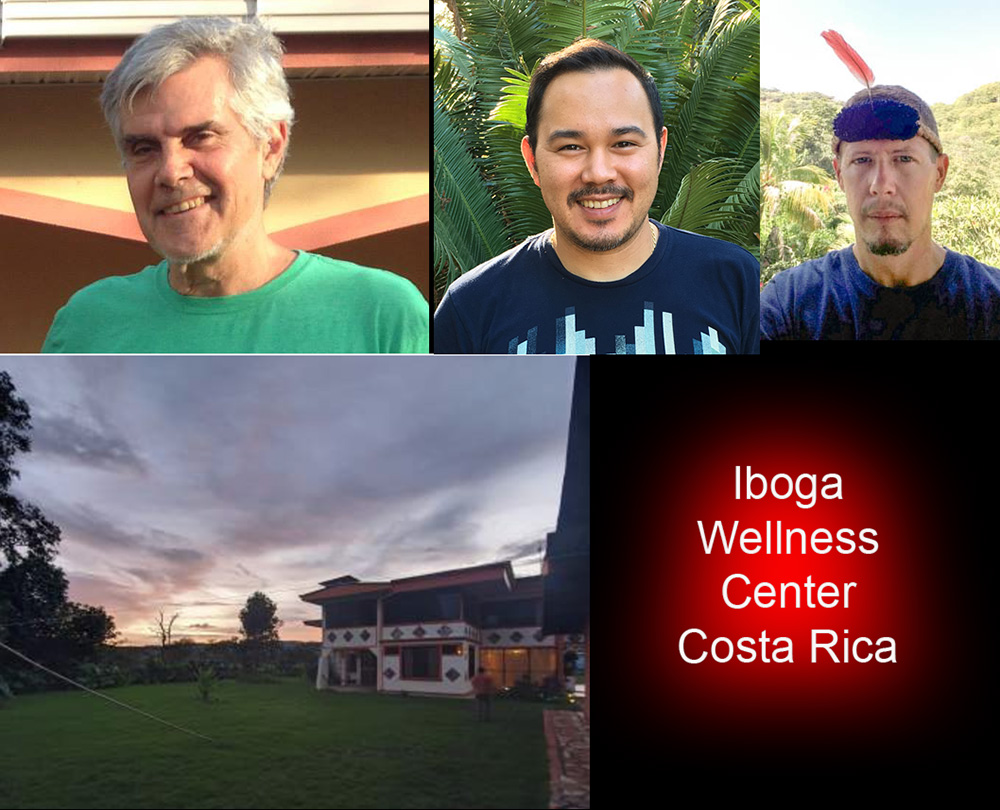
Levi Barker, Gary Cook, Mark Fristoe, and Chelsey Dickens
Mapunza

Nima Mapunza, North Libreville

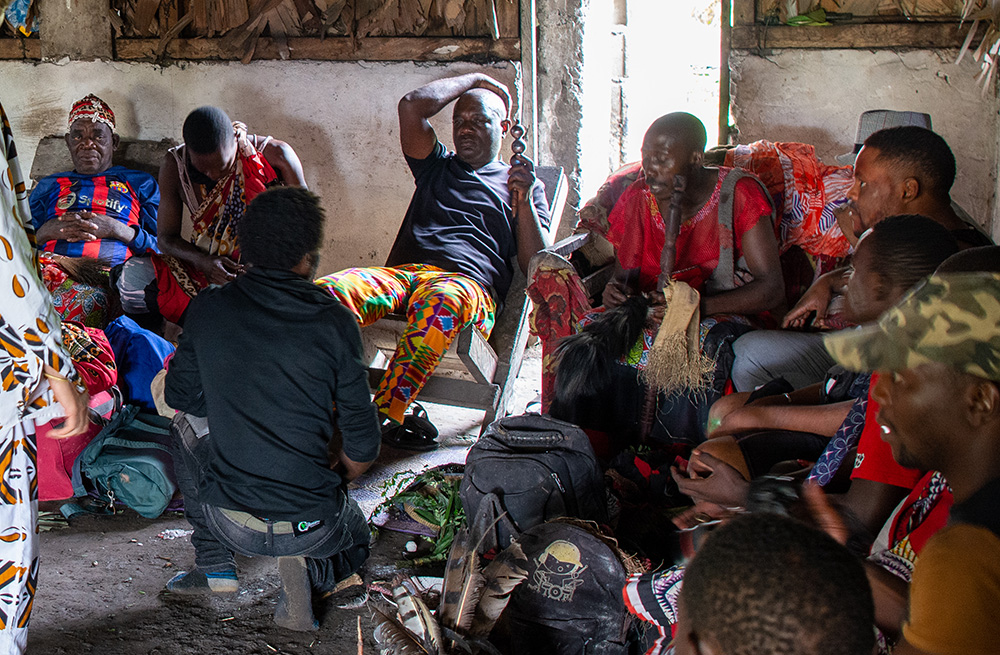

Assossa

Nima Assossa has a village on the southeast side of Libreville and is an excellent place for initiations. However, it is very challenging for Westerners as there are no mosquito nets, clean water, or proper toilets. The cost is 2,500 euros for a 14-day initiation.
WhatsApp: +241 77062668
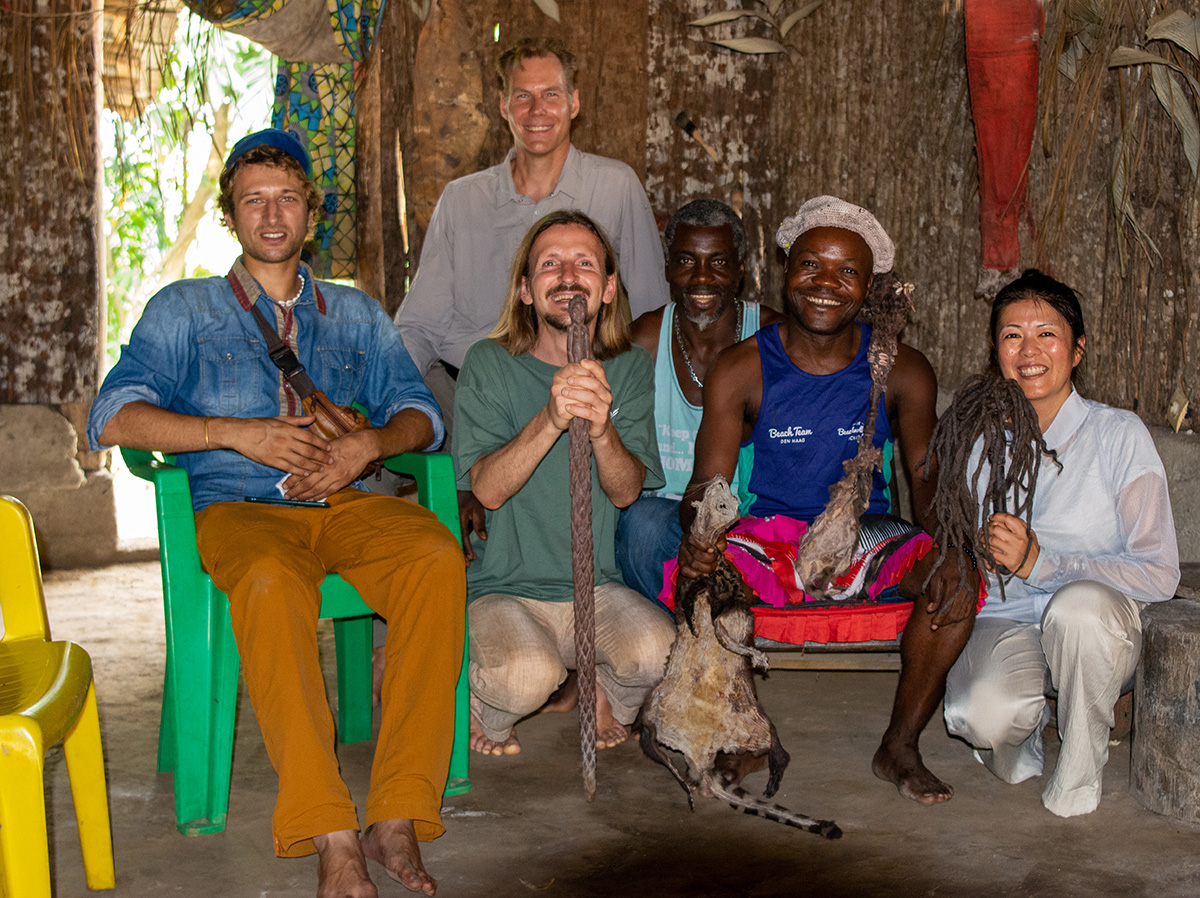
Elizabeth Bast

Costa Rica